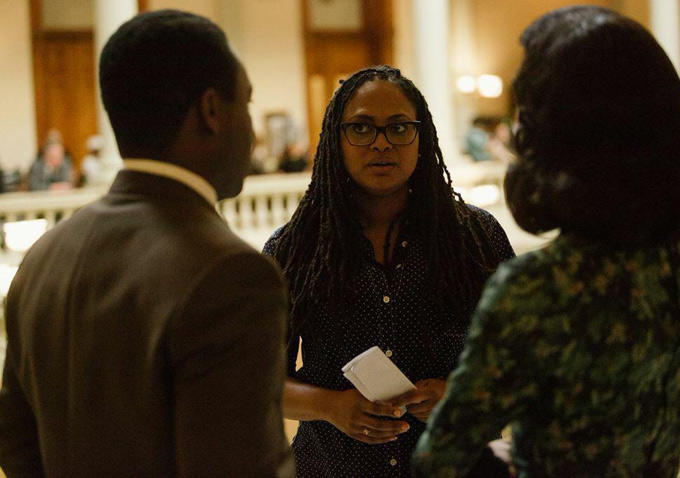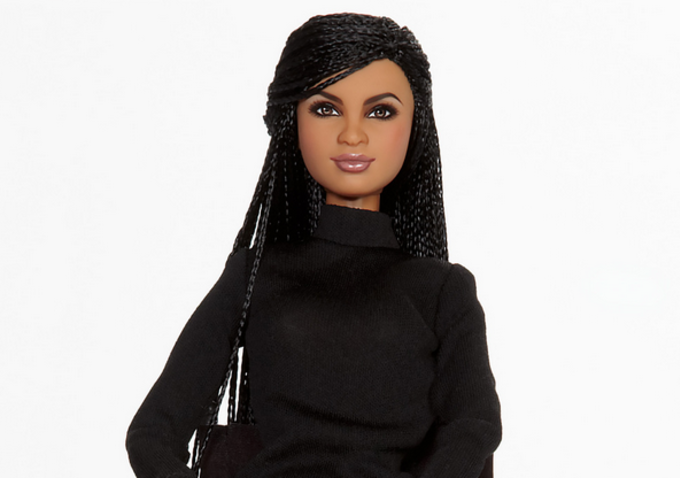How to improve the lack of diversity in film

Throughout awards season, industry members asked Ava DuVernay how to improve the problem of lack of diversity in film. Now, she’s asking them to prove they’re actually interested in doing something.
Golden Globe-nominated director Ava DuVernay (“Selma”) spent years as a Hollywood publicist before making her way into the director’s chair. It wasn’t until working on the publicity team for the 2004 Tom Cruise-Jamie Foxx thriller “Collateral” that she took the first step. Off the clock, DuVernay wrote “Middle of Nowhere,” which went on to win her a Directing Award at the 2012 Sundance Film Festival.
Just before that, in 2011, DuVernay started the African American Film Festival Releasing Movement with the goals of empowering black, independent filmmakers with theatrical and multi-platform distribution through Array Releasing. Yesterday marked the beginning of the second annual membership drive for AFFRM (African-American Film Festival Releasing Movement), which is broadening its reach to include filmmakers of color and women.
DuVernay started AFFRM with the goal of connecting filmmakers who are underrepresented in mainstream film distribution with audiences that want to see their work. “I’m a product of that,” DuVernay said to Indiewire. “If I did not have my films distributed through AFFRM and Array, I would have never had a chance to make ‘Selma,’ or do any of the things that I’m doing now. It’s so important to give these filmmakers a leg up, to give them an opportunity to find an audience.”
AFFRM’s member program was started last year because, since its inception, AFFRM was financed out of DuVernay’s own pocket. With no sponsors and no grants, AFFRM is run by a 30-person volunteer staff with the help of organizations and museums from around the country. Last year, the organization turned to the community and began its “Rebel” member program where fellow filmmakers, actors or simply fans can donate, becoming either a “Digital Rebel” for $40 or a “Full Rebel” for $100. Last year they hoped for 500 members and got about 750. This year their goal is 1000.
DuVernay said that, since her history-making Golden Globe nomination and throughout a hectic awards season, people had been asking her how they could move the industry in the right direction. “There were a lot of people trying to talk to me at Oscar time about diversity and inclusion and this is a way you can actually help further that.” AFFRM gives those people an opportunity to put their money where their mouth is. “If they really care about it now they can do something about it,” she said.
The second official AFFRM drive is just another notch in Duvernay’s fantastic year. “It’s just a question of, how do you let this be useful?” she said. “I’m hoping that some of this spotlight can shine on other people doing really great things, because it would seem to be wasted if it didn’t.”
One of the ways she is making her rising star useful is teaming up with Paramount to get a copy of “Selma” into every high school in the country. “I’ve started to hear from high school principals and teachers and stuff around the country on Twitter, which is so cool,” she said. “It’s so important to have context, for kids to see context for what they’re seeing online and on TV. Just to understand that it’s not new, this is an ongoing issue and if they change it they’ve got to understand where it came from.”
But the wildest place her fame led her was into the arms of Mattel, which designed and created an Ava DuVernay-inspired Barbie doll. “Are you familiar with the word ‘cray?’ That’s what it was,” she said. “So crazy you have to drop a z is basically what it was.” Mattel made one version of the doll for her to keep and auctioned the other off for charity. “Look, I’m just glad they got the eyebrows right,” DuVernay said. “They made good attempts at the locks, I mean they gave her some natural hair, she’s got the director’s chair.”
Barbies, DuVernay said, were a key part of her early childhood storytelling. She’d used them as her characters, telling stories with them for hours and hours, even transforming her dolls into “Cholas.” “We grew up in a black and Latino area so I would make my Barbies look like Cholas because I thought they were the most beautiful women on my street. Basically you give them awesome black eyeliner and paint their hair black. But I never had a Barbie that looked like me, with locks and braids, so it’s really cool to have one now. My mom was saying, ‘If they only knew how obsessed you were with Barbies back then.'” But how the doll looked was the least important element to DuVernay. “It’s less about what she looks like and more like, ‘Wow, this is something I can do.’ More than like we’re in a swimsuit and rolling with Ken. Like, ‘Oh, I can direct a movie,’ which you can!”
But DuVernay’s “cray” year just reinforced what some people, including Oprah, have said about her for years: that through adversity DuVernay maintains an incredibly calm demeanor and doesn’t let the frustrations of the industry get to her. “My filmmaking was not birthed out of frustration, my filmmaking was birthed out of independence. So I really have a different view about it,” she said. “I was a publicist in the industry so I’ve seen all the frustrations and then decided I wasn’t going to go that way. I think the assumption is that it’s all frustration and woe is me, and that’s really really not the case. You have a lot of people of all kinds making films outside the system and finding ways to survive.”
Calmness helps foster determination. “I just really don’t feel like anyone can stop me from doing what I want to do,” she said. “Not to say that it’s not a challenge, but there are just too many examples historically in my family, in my community, in my history, of people doing what needs to be done when they want it done. So I don’t accept that it can’t be.”
For more information on the AFFRM campaign, which runs now through June 5, watch the video below and check out the AFFRM website
Culled from IW.
news
Apple TV picks up “Dismissed” by Aysha Scott After it Hit a Million Views
Single mother entrepreneur from South-East London, built up an empire from scratch.
MOEDER Oscar® Qualified Drama Based on MH17 Airline Disaster
OSCAR® Qualified MOEDER tells a story tragedy on the Ukrainian-Russian border
Nate & John Oscar® qualified Animation Short Directed by Jumai Yusuf
NATE & JOHN heartwarming animation short qualifies for the 97th Academy® Awards
Dreama Team by Chad Weber & Steve Vanderheide Acquired by Freestyle for November Release
Feature Documentary Dreama Walton Sets Digital Debut for Global VOD Platforms and on DVD on Nov 1, 2024
LGBTQ+ Film, “Muscat” by Philippe Grenier Qualified the Oscars®
Muscat is an audacious exploration of a young boy confronted with the discovery of his identity
Joy of Horses by Ava Justin acquired by BMG Global
Joy of Horses by Ava Justin, now available across digital streaming platforms









